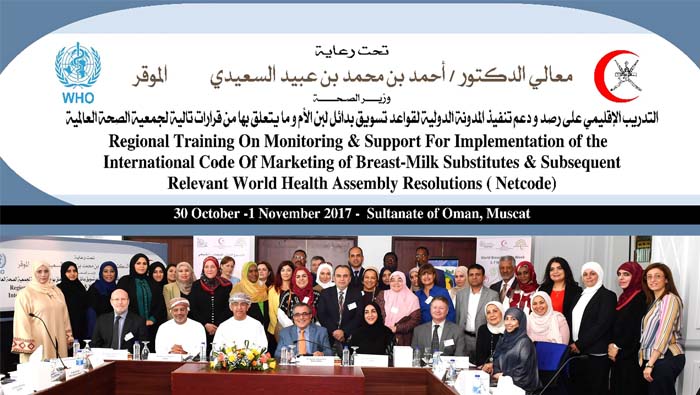
Muscat: A regional training workshop on breast-milk substitute monitoring and other connected issues began under the auspices of Dr. Ahmed Mohammed Al Sa’eedi, Minister of Health.
The workshop on “Monitoring and Support for Implementation of the International Code of Marketing of Breast-milk Substitutes and Subsequent relevant World Health Assembly (WHA) Resolutions (NetCode) aims at training the participants from MOH and other countries and building their capacity on the monitoring framework, protocols of the International Code and relevant WHA resolutions, in addition to formulation, monitoring and evaluation of national Code legislation.
The ceremony gathered representatives of the Eastern Mediterranean Region, as well as regional and international organisations. The three-day workshop, organised by the World Health Organization (WHO), in collaboration with the Nutrition Department at the Ministry of Health (MOH), is hosting 10 experts in NetCode from the region that would lead six sessions. The opening ceremony was commenced by a welcoming remarks presented by Dr. Ayoub Al Jawaldeh, Regional Adviser Nutrition of the WHO Eastern Mediterranean Regional Office (EMRO).
Dr Al Jawaldeh affirmed that the WHO is providing the member states with the tools and guidance to implement the International Code of Marketing of Breast-milk Substitutes and Subsequent relevant World Health Assembly Resolutions (NetCode) that will enable them to set up or strengthen effective monitoring systems in order to eliminate inappropriate marketing of foods for infants and young children, as well as assessing the level of adherence with the Code and national measures.
He said that the comprehensive implementation of the Code would serve WHO goal that represents in increasing rates of exclusive breastfeeding for infants less than 6 months of age by 2050.
Furthermore, the speech underlined the objectives and expected outcomes of the workshop.
This event aims at training the participants from MOH and other countries and building their capacity on the monitoring framework, protocols of the International Code and relevant WHA resolutions, in addition to formulation, monitoring and evaluation of national Code legislation.
Later, the sessions of the first day began that addressed at first the new developments in relation to the International Code highlighting the WHO Guidance on Ending Inappropriate Promotion of Foods for Infants and Young Children. Moreover, the inappropriate marketing practices in EMR was reviwed, and last session scoped the status of National Legal and Regulatory Measures to implement the International Code in EMR.
The sessions of the remaining two-day will highlight monitoring and enforcement of National Code Legal and Regulatory Measures, and analyzing country challenges and needs for strengthening code legislation and monitoring.
This regional meeting comes in line with the Sultanate celebration of Breastfeeding Week, which will be observed on the 1-7 November under the theme ‘Sustaining Breastfeeding Together’.
On May 1981, the World Health Assembly (WHA) adopted the International Code of Marketing of Breast-milk Substitutes to protect breastfeeding from aggressive and unethical marketing practices. The Code and subsequent relevant WHA resolutions express the collective will of the highest global authority on health, and carry substantial political and moral weight. The Code applies to the marketing, and related practices, of the following products: breast-milk substitutes, including infant formula; other milk products; foods and beverages, including bottle-fed complementary foods, when marketed or otherwise represented to be suitable, with or without modification, for use as a partial or total replacement of breast-milk; feeding bottles and teats. It also applies to their quality and availability, and other essential related information.
The Sultanate was selected among eight countries in the world to implement the NetCode evaluation and follow-up system. As a result, the MOH, represented by the Nutrition Department and in collaboration with the MOH Information Technology, introduced e-notification for the national code violation of Marketing of Breast-milk Substitutes